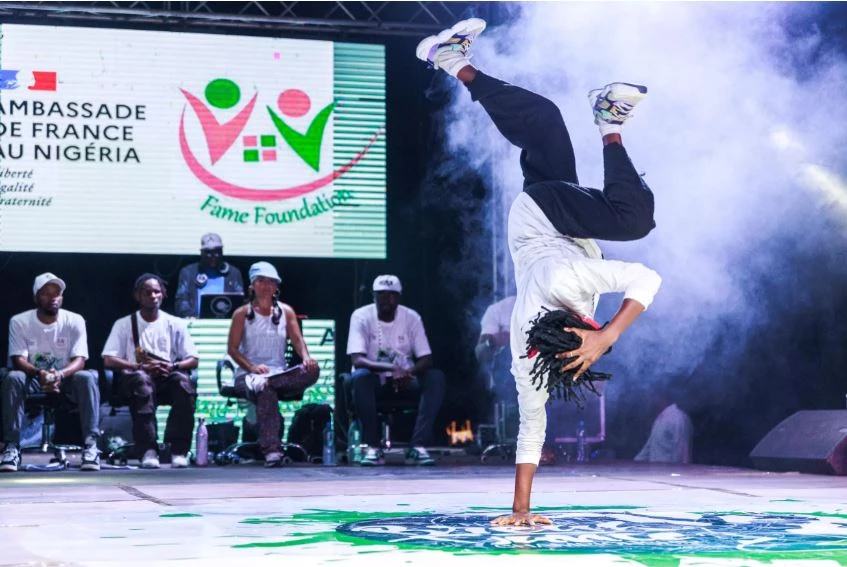Sweaty and out of breath, B-boy Alpha comes down grinning from the stage where he has just won Nigeria's national breakdance championship and secured a trip to Paris for the Olympics this summer.
"This is the dream of every athlete," said the 29-year-old men's winner from Lagos, real name Salaam Idris.
Breakdancing, or breaking, is making its debut as an Olympic sport this year and Nigeria's competitors have been vying to bring their own distinctive style to the games.
Organised by the French embassy and the Nigerian FAME Foundation which sets up projects for young people, the national final selected a "B-boy" and "B-girl" breakdance competitor to take part in the qualifiers in the French capital.
Victoria Adesoye, 26, stage name B-girl Vicky, has just beaten five rivals to win the women's competition and is looking forward to showcasing her skills in Paris.
"We have our own style here, Afro, I want to teach them our originality," she said. "I want to teach my style over there."
JC Jedor, a Nigerian breakdancing celebrity on the jury, said Asian competitors were renowned for their power, Europeans for their walking moves, and the French in particular for their "aggressive" style.
"When you come down to Africa, you see that our approach is more rhythmic," the 32-year-old said.
"We carry groove, we carry rhythm, and we carry our culture along when we dance."
Early rounds last year selected around 20 dancers from the cities of Abuja, Kaduna, Kano, Lagos and Port Harcourt.
- 'Dream come true' -
Born in the Bronx in the 1970s in the emerging American hip hop scene, breakdancing gained worldwide attention in the 1990s.
"Breakers" compete in acrobatic dance battles, performing breathtaking moves as a DJ spins tracks.
Hip-hop began to make inroads in Nigeria in the late 1990s, spurred by the rise of groups such as The Remedies, Trybesmen, Plantashun Boiz and Ruff Rugged & Raw.
But breaking is still a fringe discipline, as evidenced by the meagre turnout at Sunday's competition in Lagos.
Nigeria's breakdancing scene is "still in its infancy, but there is all the potential for it to develop," said Flavor Roc, aka Nadine Messias, 43, a big name in French breakdancing who was a juror in Lagos.
"Nigerian culture is very rich in its roots," especially given its "enormous funk culture with Fela Kuti," she said, referring to the Afrobeat legend.
In Nigeria, some even claim to be the originators of the discipline, citing archive footage from the 1950s showing traditional Nigerian dancers in Kaduna performing moves in a circle.
Jury member Funsho Olokesusi, director of a dance company in the northern state, said their "competitiveness" and individuality gave Nigerian dancers an edge.
But especially outside the economic capital Lagos, breakdancers struggle with a lack of sponsorship and the difficulty of getting recognised.
"As Nigerian dancers we face many challenges," he said.
Many potential breakdancers "have to do other things, regular jobs, some of them have to be peasants, some of them have to be tailors. So they don't have big opportunities."
But Lagos gives would-be breakdancers the chance to get involved with a vibrant community and join frequent events, he said.
The opportunity for Nigerian competitors to come together and take part in the Olympics, he said, was "a dream come true".


